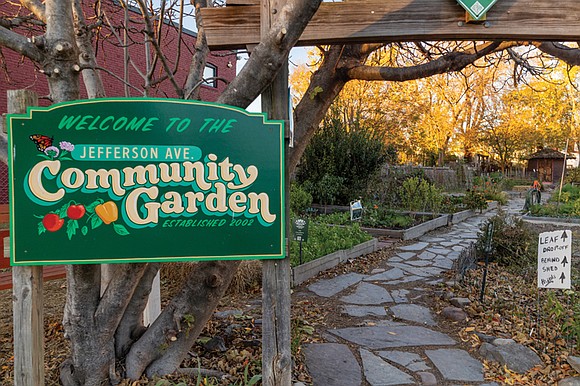Union Hill garden preserved for community use through land transfer
11/13/2025, 6 p.m.
The Jefferson Avenue Community Garden in Union Hill has secured its future through a conservation easement and a transfer of ownership to Verdant Richmond.
Founded by neighbors in 2000 on roughly 0.116 acres at 2310 and 2312 Jefferson Ave., the garden has been in continuous operation since 2002. It began through an agreement with the then-owner, Richmond Affordable Housing, now known as the Better Housing Coalition (BHC), which allowed residents to install raised beds to grow fresh produce in an area long without grocery stores.
The garden also marked the start of Tricycle Gardens, a nonprofit that used community gardening to revitalize urban neighborhoods and address food access issues. Tricycle Gardens expanded to several sites across the city.
Unlike many community gardens that faced eviction due to lack of ownership or formal leases, Jefferson Avenue Community Garden secured its tenure when BHC gifted the property to Tricycle Gardens in 2019. Uncertainty arose the following year when Tricycle Gardens ceased operations and transferred the property and its urban agriculture fellowship program to the Enrichmond Foundation, which dissolved abruptly in July 2022.
The Capital Region Land Conservancy (CRLC) navigated the Enrichmond dissolution to purchase the property. Working with Stacey Moulds, the garden manager, CRLC recorded a conservation easement and transferred ownership to Verdant Richmond, which now serves as the garden’s fiscal agent.
“Over 20 years ago, I contacted Bill Greenleaf to inquire if CRLC would protect this property under a perpetual conservation easement,” Moulds said. “We are now here! I am overjoyed that this land will be forever preserved as a community garden and greenspace for everyone to enjoy.”
Council President Cynthia I. Newbille, who represents the 7th District, said, “Green places, spaces and community gardens allow our urban community to breathe and where neighbors gather together, bodies and souls are holistically nourished.”
While 24 community gardens operate on city-owned land under the Richmond Grows Gardens initiative, Jefferson Avenue Community Garden predates many of these and was established on privately owned property. Tricycle Gardens also operated a half-acre urban farm in Manchester for nearly a decade until the site was redeveloped.
“Whether operating a community garden, an urban agriculture site or a rural farm, those who grow the food we eat often do not own the land on which they work,” said Parker C. Agelasto, CRLC executive director. “It is therefore essential to the future viability of our agricultural sites that those entities that invest to improve soil health, maintain greenspace, and put food on the table have self-reliance and don’t face eviction when a landlord has different plans.”
Approximately one-third of all agricultural acreage in Virginia is leased. Between 2017 and 2022, Virginia lost more than 488,000 acres of farmland, with 10% of farms ceasing operation. In the Richmond region alone, 9,632 acres of farmland and 227 farms were lost. More than 80% of Virginia’s 39,000 farmers operate small farms generating less than $50,000 in annual sales.
The conservation easement on the Jefferson Avenue site prohibits construction of dwellings and limits impervious surfaces. Deed restrictions require the property to be used solely as a community garden and owned by a nonprofit for public benefit.
“As an advocacy organization for the city’s greenspaces, it was appropriate for us to expand our vital role as a community partner to serve as a fiscal agent for 11 community gardens and five friends groups when Enrichmond dissolved,” said Lawrence Miller, president of Verdant Richmond. “We look forward to continuing to support the Jefferson Avenue Community Garden well into the future.”







